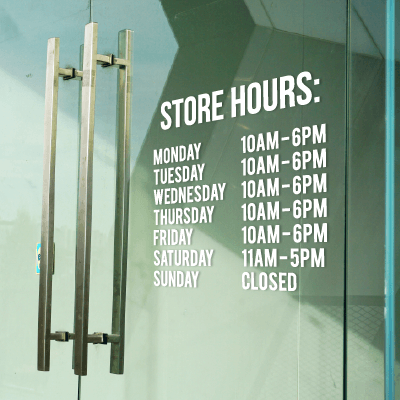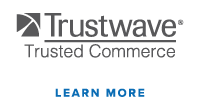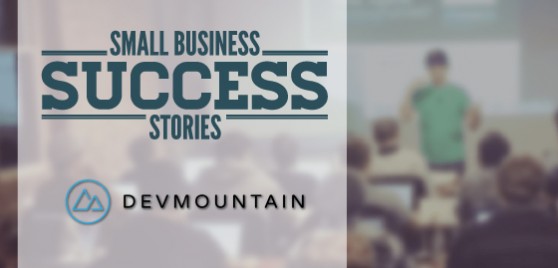
Our interview today is with the CEO of Utah based DevMountain, Cahlan Sharp. DevMountain offers both part-time and immersive coding classes for those looking to refine skills or start a career in web development.
Tell us about yourself.
I grew up in a small town in Northeastern Nevada and attended school at Brigham Young University in Provo, UT. During school, I struggled with the weight of choosing a career path and ended up majoring in Portuguese.

During my undergrad time, I fell in love with web development. I devoured online learning materials (somewhat scarce back then) and built, and built, and built. Eventually, I finished school with a job in web development, which progressed into a small consulting company that specialized in online learning.
I returned to BYU to complete a Master’s degree in Instructional Psychology and Technology, only to dive even deeper into web technology and entrepreneurship by moving to San Francisco to join a series of startups, culminating in moving back to Utah with Scan, a hot startup out of Provo. On the side, I began running night/weekend classes called DevMountain. DevMountain had so much interest and success that in February of 2014 I decided to quit Scan and make it my full-time gig.
I have four children and a beautiful, supportive wife, without all of whom I could never last.
How have past experiences (success and/or failures) shaped you/What have past experiences taught you that were critical in founding DevMountain?
Some entrepreneurs are blessed with instant success. Most of us try over and over seeking almost any kind of measurable success. Most of startups are a “grind,” meaning that very infrequently do you begin with an idea and a year later you find yourself gawking over a multimillion dollar exit. Most products fail. Most companies fail. The companies who don’t fail often spend years in the “troughs of sorrow,” the place where a company languishes between initial launch/PR buzz and the much needed next stage that represents product-market fit, additional investment, or profitability. You learn a lot going through these phases. You learn a lot working in companies that fail. You find out what makes leaders effective, what motivates you, what makes your fellow employees tick, and how hard it really is to succeed. I never take success for granted. Any good news or milestone I hit is appreciated and celebrated, but always with an eye of cautious optimism, knowing that there could [and most likely will] be difficult bumps in the road ahead.
So each experience I’ve had, especially the failures, have taught me an immeasurable amount.
For DevMountain specifically, I’d say there are a few principles that have made all the difference:
- Striking while the iron’s hot. I had to be extremely aggressive in getting DevMountain off the ground. Obsessing over having legal docs, trademarks, a perfect website, would have all lead to being too late to make an impact. In business and especially in startups, timing can be everything.
- Early adopters and initial success. For our business, much of our prolonged success is owed back to early adopters and the great experience they had with us. We had to make sure it was a great experience, even though it was early and we were really presenting our MVP (minimal viable product). I’ve learned from this and other businesses that although you want to ship as soon as possible and simplify your product into that ever-elusive MVP, first impressions are the most important.
- You know your business better than anyone. For every piece of advice or reverse-engineered recipe of success for startups, there’s a conflicting version. Startup advice is a mess of contradiction. No two companies (or success stories, or failures) are alike. There is no absolute recipe for success. You must constantly play the game of trusting your gut, following your instincts, but also seeking wisdom from smart people and following trends. Only you can chart the path to success for your startup. Gurus, mentors, VCs, and advisors can’t do it for you.
What does your company do?
We’re the top rated coding school in the country, and the largest institution of our kind in the Intermountain West; between California and Illinois. We teach technology and coding to serious, dedicated people in Immersive and After Hours formats. Our Immersive classes are intense, 12 week experiences that include housing and a world-class educational experience.
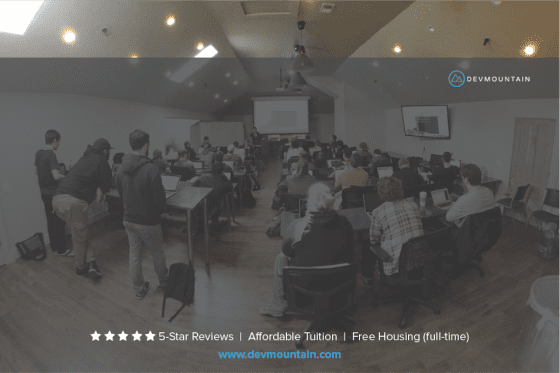
Where did the idea for your company come from? Were you first to market? First to market in Utah?
I lived in San Francisco just before I moved to Utah, and had seen a few coding bootcamps popping up around the country. I was very familiar with Utah and the strong tech vein that flows through the economy here, so it seemed odd to me that no one had tried it yet. I’ve been an educator/teacher and a software engineer for a long time, so this was a really good fit for me.
Being that I had a full-time job, I decided to launch the first ever part-time (we call them After Hours) bootcamp. The success and demand from there grew so quickly that I left my full-time job in February of 2014 to tackle DevMountain with everything I had. So not first to market in the country with the concept (although the part-time model is very unique), but first to market in Utah.
If you were first to market, do you think you’re prepared to compete with the copycats that will inevitably come?
We’ve already had them. Very literally copycats, in a couple cases. Our best competitive edge is our success, our students’ outcomes, and continuing to build and communicate a very strong brand.
If not first to market, what did you change to offer the proverbial “better mousetrap”?
The After Hours solution was a great start, and the housing with our Immersive programs has been a strong motivator.
What sets you apart from your competition OR what is your unique selling proposition?
A lot of things. But starting with product, we hire and retain really really great teachers. Being first to market in Utah, having good initial traction, and continuing to build a strong brand has helped us attract and keep those great instructors that are so key to our business. We’ve always paid them very well, which they appreciate. Even in the early days.
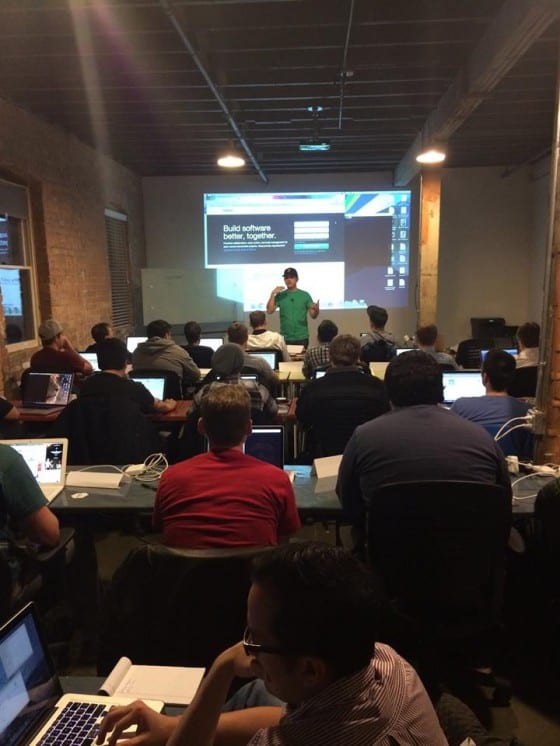
What about indirect competition such as online learning giants Lynda, Tuts+, etc. How does DevMountain compete with these online offerings that may be cheaper or even more convenient and definitely have stronger/more established brands?
We feel we are in a completely different (although adjacent) space. There is a ton of online content; a lot of it is really good. But it is extremely difficult to go from knowing nothing to being a proficient coder, ready for a job using only online resources. There are too many gaps. Too many things you miss just doing online courses. In fact, our best, most ideal students are those that have been trying those resources and are now ready for the next level.
What is one strategy for gaining customers that you have been successful with? Is there an area that you’ve struggled with that you believe is critical to future success? If so, how are you overcoming that?
We’ve employed a good mix of local, face-to-face marketing as well as larger, more scalable targeted marketing. We’ve got struggles just like any business, but I think the key for us at this stage in our company is hiring the right people with the right expertise to tackle the tough problems that we’ve been unable to really solve for the past couple years.
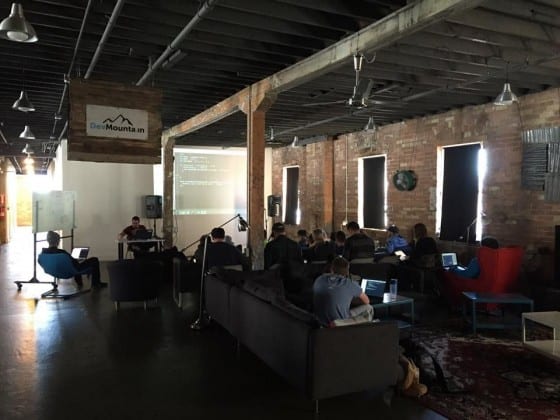
What is one of the biggest challenges you have had with your business and how did you overcome it?
Geeze. There are lots. I’ll name a couple:
- Figuring out the educational model. I have a Master’s degree in this field and it’s still been extremely difficult. To provide a world-class education is not a light thing. We’ve defined, refined, and revamped our teaching methods and curriculum nearly every cohort. We’re obsessed with finding better ways to teach these students what they need to know in such a short amount of time.
- People problems. Our students are people, they have complicated lives. Some of them are going through real challenges in their lives and that comes through in the class. We’ve learned a lot of interesting psychology. We’ve actually hired people who’s sole job it is to help everyone deal with stress and be successful. It’s made a huge difference.
- Physical locations. Our space is a part of our product. It needs to communicate who we are and needs to contribute to the overall brand and experience. Finding good space that’s cost effective, working with real estate agents and landlords, these are things I’d never thought I’d be spending so much time on as a software engineer.
If you could rewind time is there anything you’d do differently? If so, what?
I’m sure there are small things here and there; mistakes I’ve made, for example. But really, I’m very proud and extremely grateful for how well things have gone. Having worked in six startups, I’ve learned that with the best of teams and best of ideas often it comes down to timing and/or luck. We’ve worked very hard, but have also had fortuitous timing and great luck.
If you had advice for other SMB owners, whether it’s your industry or not, what would it be?
I think some of it is covered above, but I might add a couple things:
- Do something you’re passionate about. Never, ever do something just because there’s a market or a money-making idea. Money is one of the dumbest reasons to get involved in a startup. It can be a powerful motivator, for sure, but if you aren’t driven by more than money you’ll either make very short-sighted decisions or burn out after the grind really hits.
- Balance. My wife and I have had to learn balance because of startups. Sometimes the scales lean one way, sometimes they lean another. She and I are a team and we work together. Give and take. Great principles to learn in marriage in general, but startups almost require this of you if you want to maintain a good relationship with your significant other. I don’t believe (as many startup mentors/gurus do) that you cannot maintain a good startup and have other relationships be a priority. For me, without these other meaningful relationships I would lose drive or motivation or emotional balance to be able to do what I do every day.
- Never underestimate the power of hard work. Ideas are worthless. The best ideas require amazing feats of execution in order to succeed. If you are the kind of person who can put the in the hours, forget the excuses, get things done and outperform your competitors, you might just make it!
How do you “WOW” your customers?
We’ve been working hard at this. Our interaction with our customers starts with our marketing and branding. We want everything we do, show, or say to be reflective of who we are and what we want to portray to our customers. Then when they walk in the door, everything needs to be on point and continue to reinforce that experience. We try to go “above and beyond,” which is a cliché, but it really just means you have to surprise your customers and do things they don’t expect you to do.
What do you think the future holds for your business?
We think there is a lot of opportunity for growth in similar markets as well as helping anyone and everyone continue along their educational journey. Learning something for the first time in a class is what we do, but we want to help people to continue to refine their skills and gain mastery over the subjects they learn.
If we continue to deliver a great experience and strengthen our position, I can’t see why we couldn’t be around for a very long time.
Do you think the model is replicable in other areas of the US or is Utah a unique fit for such a venture?
I do, although it’s also going to be unique in every market you enter. Utah has a unique culture and we feel we’ve been able to jive well with that. Any market we enter will require us to understand the ecosystem, the culture, how people think and what they want. Then we tailor our experience to that and hopefully deliver a great product.
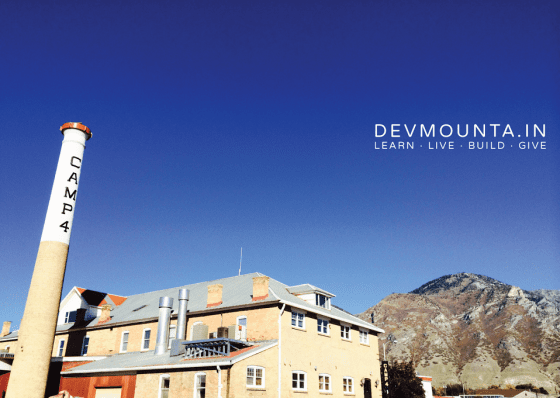
Without sharing detailed financials can you speak to your growth to this point and why you think it will continue?
We employ nearly 50 people from full-time employees to instructors and mentors. We’ve had over 750 applications for our programs and we expect that application rate to pick up quite a bit this year. By Q2 of this year we’ll have around 120 students per quarter completing our programs.
Where can you be found on the internet?
Website – http://devmounta.in
Facebook – https://www.facebook.com/DevMountain
Twitter – http://twitter.com/DevMtn
Instagram – http://instagram.com/devmtn
Editor’s Note: Many thanks to Cahlan for an insightful interview on startups and DevMountain. As a veteran of the startup scene Cahlan offers some excellent advice on motivation, work-life balance, the reality of “the grind” while working at a startup, the advantage of being a first mover and the constant process of refining your brand and product to deliver something that is both valued and sought after by prospective customers.








